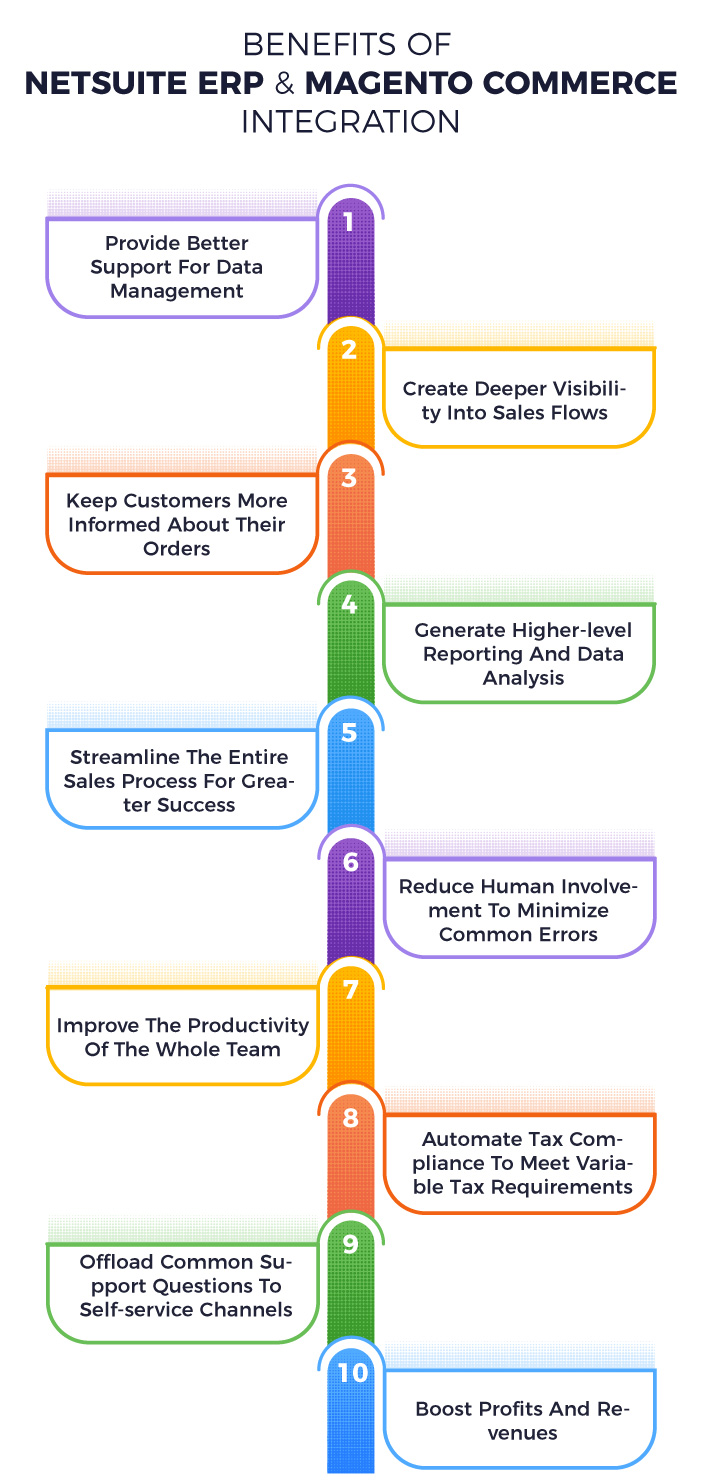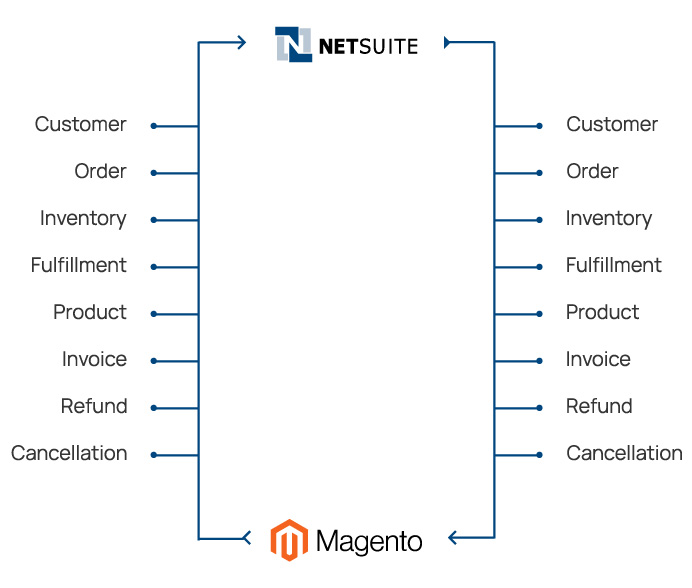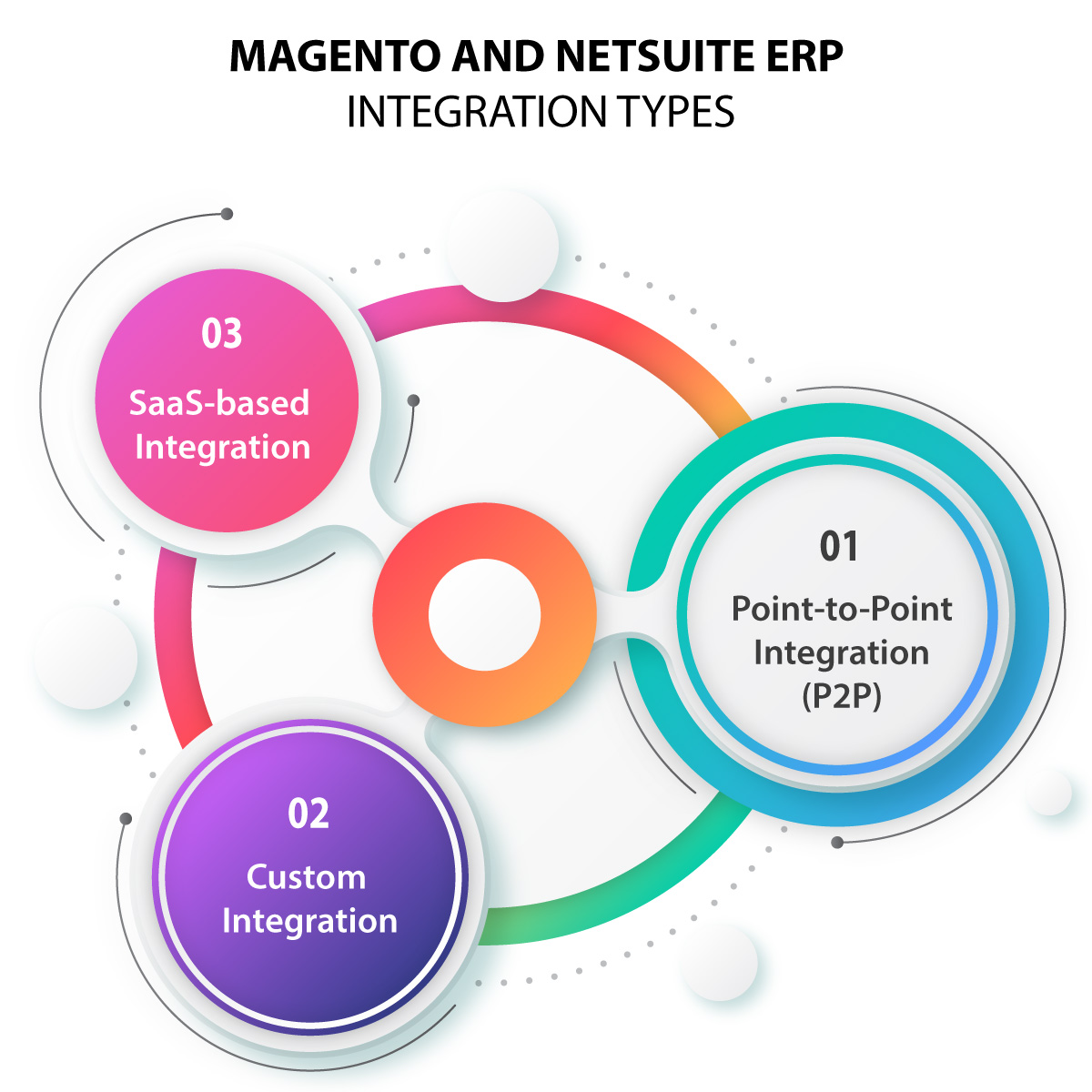Enterprises, sellers, distributors, and online ventures who operate their businesses through a Magento 2 website and rely on the NetSuite ERP platform separately, fail to get the maximum advantages from the two systems. Because of handling two separate systems they often need to invest huge amounts of time in managing business and operational data between the two platforms. The segregation of the two platforms also enhances the chances of data errors.
Ultimately, these challenges and frictions can be reduced to a minimum by the NetSuite ERP integration with Magento 2.
The integration of two platforms will facilitate complete business process automation streamlining different tasks resulting in the least consumption of time and data errors.
Magento and ERP integration is particularly popularised by NetSuite because of its comprehensive package of customisable solutions covering almost all business niches. Here through the rest of the post, we are going to explain how NetSuite ERP integration with Magento is going to work and what end users can expect from this integration.
What You Should Expect From This Integration?

With NetSuite e-commerce integration a business can easily help syncing data between the Magento2 and NetSuite platforms through easy process automation. On the one hand, this allows sellers to automate order fulfilment and make real-time inventory updates, for the business managers this allows a 360-degree view of the business processes and data.
With NetSuite, Magento ERP system integration ensures optimum flexibility in procuring inventory and shipping goods while streamlining the entire process. Thanks to the real-time and comprehensive visibility of inventory data e-commerce stores can also maintain highly competitive shipping time while ensuring trustworthiness and smooth flow of revenues.

Thanks to the integration, the backend processes of Magento e-commerce stores run more smoothly and this gives employees and administrators a lot of free time for investing in new projects. The syncing of information across multiple platforms also results in faster processing of all orders and maintaining a consistent customer experience irrespective of the platforms.
How To Choose The Right NetSuite Magento 2 Integration Approach?
Now that basic expectations from a NetSuite Magento integration are clear to us, it is up to us to choose the right integration approach for a more fruitful integration. To begin with, we must understand that integrating these two disparate systems has its challenges. Automating the data flow across platforms without causing process silos and security concerns remains always a crucial challenge. In this respect, the role of expert NetSuite integration services can prove to be important.
For choosing the right integration approach for bringing these two platforms, you need to consider the following factors.
- In case your business processes involve a lot of complications or several unique proprietary requirements, you are likely to need a custom integration.
- How fast your business is growing and how is data volume corresponding to customers, orders, products, categories, etc are increasing? Based upon this you need to choose an integrated approach focusing on scalability.
- Is your business B2C, B2B or B2G (business to government) in nature? Based upon this you need to choose an approach.
- How better you can integrate suppliers with the system and how complex is the order realisation process will also become a deciding factor for your choice of integration approach.
- Your access to technical experts and IT resources for the integration project will be a deciding factor for your choice of approach.
- Lastly, how much financial budget for the integration your business can afford will be decisive for the choice of integration approach.
One can hardly deny that every business is inherently different and hence such integration in the context of every business is likely to be different. This is why it is always advisable to evaluate the requirements and challenges well in advance and accordingly choose the most suitable one.
Explaining The Key Ways To Integrate Magento and NetSuite ERP

When it comes to NetSuite Magento integration, there are 3 principal ways to integrate these two platforms. Here we explain these three ways one by one.
Point-to-Point Integration (P2P)
This is one of the most popular integration methods offered by vendors creating Magento extensions or APIs for NetSuite integration. Without using any operational or connecting platform between Magento and NetSuite, point-to-point integration ventures to sync multiple data facets such as orders, inventory, customers, and items between the two systems.
Such an integration method is less complex and more cost-competitive compared to other methods and this is why many sellers and e-commerce startups find it more effective in their initial years of growth.
Just like its simplicity and cost benefits the method has its shortcomings as well. Peer to Peer integration is more rigid in character and can cause significant frictions as your business grows. This integration method only permits 1:1 integration and integrating new modules often becomes challenging.
Custom Integration
Depending upon the business complexity, requirements of different modules and scalability needs, often e-commerce stores need to customise the ERP system to get the maximum benefits of the platform. The custom NetSuite ERP integration suits such contexts.
In the majority of cases, custom development processes to facilitate smooth integration are taken care of by the company’s developers or an outsourcing company. The integration of two environments requires custom coding powered by in-depth knowledge of both NetSuite and Magento2 platforms. It requires considerable expertise and experience as any error can expose the business data and processes to irreparable damage and loss.
Lastly, custom integration is cost-intensive and is only suitable for really complex business scenarios involving too many complexities and demand for faster scalability. But businesses requiring custom integration cannot find other methods satisfactory or justifiable for their processes. For this method, you also need to find the most experienced NetSuite integration partners.
SaaS-Based Integration
The ultimate and probably the most popular and affordable way of integrating Magento with NetSuite ERP is to rely on a SaaS (Software as a Service) based platform. These integration-ready platforms are pre-built connectors created keeping in mind the specific requirements for integrating Magento2 with the NetSuite platform.
In complete contrast to the point-to-point (P2P) integration method, the SaaS connectors can be configured and customised to accommodate evolving enterprise requirements. Such connectors can allow retail businesses to define limits for the data movement, whether inside the system or outside of it. This ensures optimum data visibility and comprehensive control.
Thanks to such integration, businesses can create specific commands about processing every order based upon the designated fulfilment criteria such as pricing or their locations and serial positions in the warehouse. Most importantly, such customised order fulfilment just happens automatically after the order is processed.
SaaS-based integration solutions are comparatively expensive than the so-called P2P integration method as they offer a lot of features and functionalities. On the other hand, they also cost less compared to the custom ERP integration projects. SaaS-based integration solutions can be obtained by e-commerce merchants simply by subscribing to the service against monthly fees.

What Should Be The Best Choice For You?
Irrespective of the differences of requirements and enterprise nature, SaaS integration solutions come as the ideal for bringing the NetSuite ERP power to Magento stores. This integration perfectly fits across the vast majority of businesses across both B2C and B2B segments and offers a robust as well as a cost-effective choice.
Custom integration is also highly effective if your business can afford it. Custom integration suits only enterprise segments with fast scaling data volume and complicated business processes.
Conclusion
All the integration methods we have explained so far are already tested and tried across numerous NetSuite Magento integration projects. While the pros and cons of each method are already explained, it is up to your consideration of various factors to take a final call.















